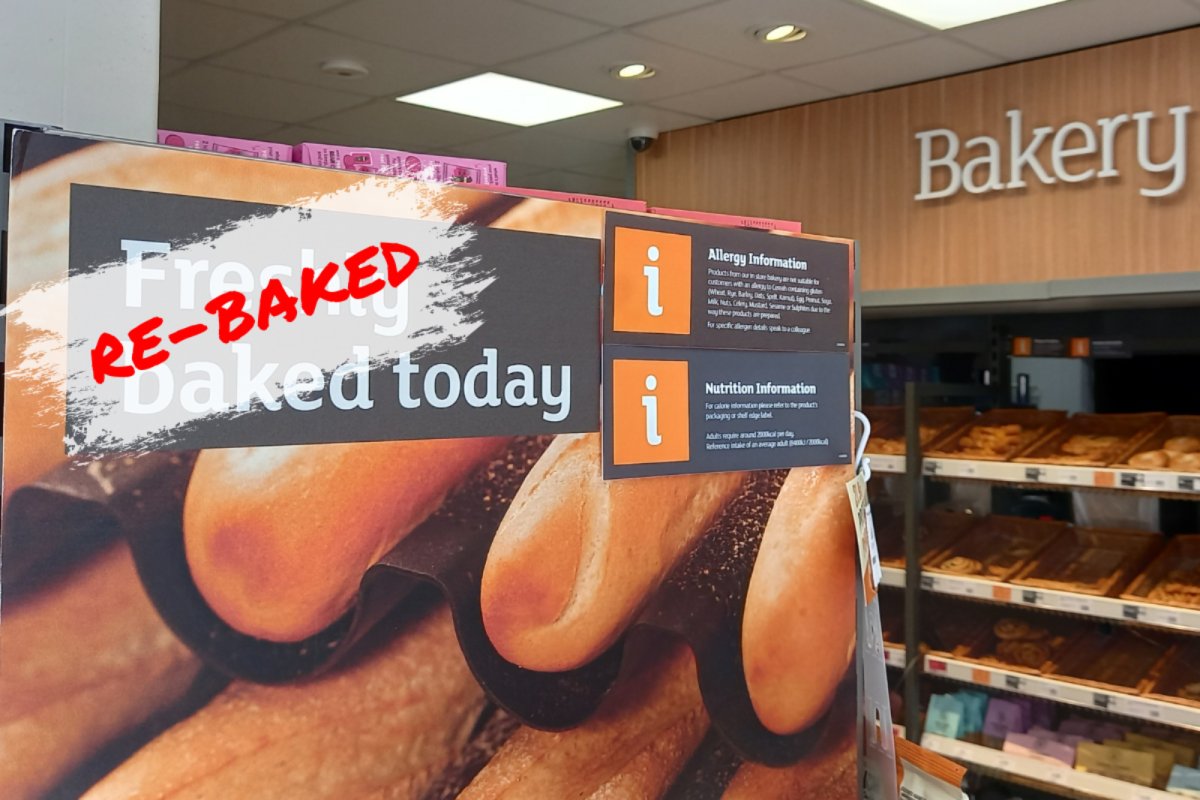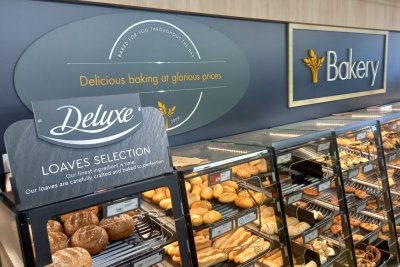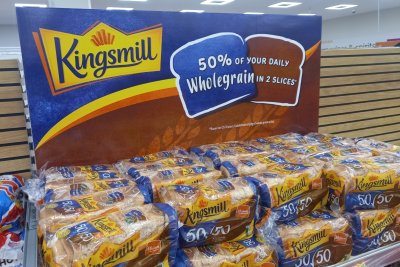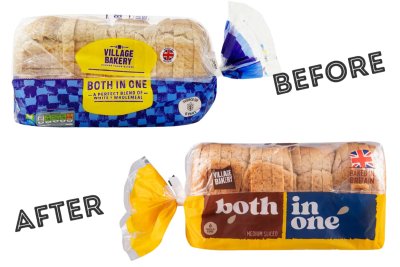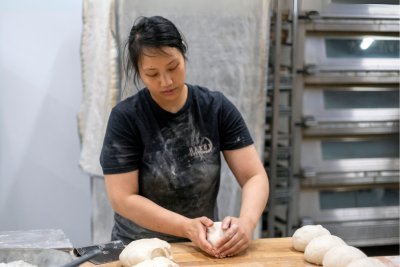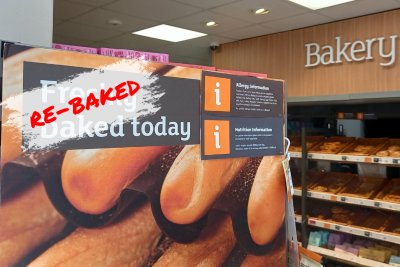 Loaf tanning salon. Credit: Chris Young / www.realbreadcampaign.org CC-BY-SA-4.0
Loaf tanning salon. Credit: Chris Young / www.realbreadcampaign.org CC-BY-SA-4.0
Freshly faked by Sainsbury’s?
The Real Bread Campaign's trading standards complaint.
The Real Bread Campaign believes that Sainsbury’s ‘in-store bakery’ marketing is misleading and breaches consumer protection regulations. On Monday 10 June 2024, the Campaign submitted a complaint to Oxfordshire County Council, which has the Primary Authority relationship with Sainsbury’s for trading standards.
Introduction
The UK’s second largest supermarket chain markets its ‘bakery’ section products using claims including ‘freshly made every day’ and ‘freshly baked bread’. Bags for the company’s ‘Taste The Difference’ range state: 'Our speciality breads are freshly baked in store every day...' To reinforce these messages, the company displays the products in ways that are distinctly different from merchandising in the rest of the store.
The Real Bread Campaign has found that Sainsbury’s uses such marketing at stores where no bread is freshly made from scratch on site, instead re-baking products that were manufactured elsewhere.
Sainsbury’s current programme of switching from ‘scratch baking’ (making products from basic ingredients) to ‘bake off’ (merely re-baking bread that was manufactured elsewhere) means that the claims are increasingly unrepresentative of the company’s ‘in-store bakeries’ in general.
The company refused to give direct answers to questions about whether it uses such claims to market products that were previously frozen or manufactured outside the UK.
To be clear, this complaint is not that Sainsbury’s is making cheap products widely available, it is about how the company is marketing them.
A re-baked product is not freshly made or freshly baked
FSA guidance states: ‘Terms such as “freshly baked”, “baked in store” and “oven fresh” may mislead consumers into believing that they are being offered products that have been freshly produced on site from basic raw materials. Some stores sell bread made from part-baked products that have been packed in an inert atmosphere or frozen off-site then “baked off” at in-store bakeries. Use of terms like “freshly baked”, “baked in store” and “oven fresh” on these products could potentially infringe the general legal provisions…’
These provisions include Regulation (EC) No 178/2002, which states that ‘it is a general principle of food law to provide a basis for consumers to make informed choices in relation to food they consume and to prevent any practices that may mislead the consumer.’ More specifically, Regulation (EU) No 1169/2011 requires that ‘food information shall not be misleading, particularly: (a) as to the characteristics of the food and, in particular, as to its nature, identity, properties, composition, quantity, durability, country of origin or place of provenance, method of manufacture or production.’
Sainsbury’s uses the claims ‘freshly made’ and ‘freshly baked in store’ at stores in which pre-made ‘bread’ products are merely loaded into what we call loaf tanning salons - ovens in which they’re re-baked to brown and crisp the crust.
Alongside ‘bread’ products, pastries might be made elsewhere and receive their first baking in a Sainsbury’s store but this is still not what the average consumer would understand ‘freshly made’ to mean.
As no ‘bread’ product is ‘freshly baked’ or ‘freshly baked’ in such stores, the Campaign believes that Sainsbury’s use of these claims to market them is misleading and breaches the regulations.
Sainsbury’s evasiveness
To ascertain the general picture, the Campaign emailed Sainsbury’s customer services on 3 June but received no reply. The Campaign also emailed the company’s press office, asking the following questions:
- How many stores does Sainsbury’s operate in the UK?
- At how many of these stores are all bread products in the in-store 'bakery' section made fresh from scratch on site?
- At how many of these stores are all bread products in the in-store 'bakery' section made elsewhere and then re-baked in-store?
- At how many of these stores are bread products in the in-store 'bakery' section a mix of lines made and baked fresh from scratch on site, and lines made elsewhere and then re-baked in-store?
- How will these numbers change following the recently-announced switch ‘to a more efficient way of freshly baking products in-store [and] plans to move more stores to this model’?
- How do shoppers find out whether or not all bread products in the 'bakery' section of a particular store are made and baked fresh from scratch on site?
- Are any products in the in-store ‘bakery’ section made outside the UK and, if so, which ones are made where?
- Does Sainsbury’s still operate a bakery college and, if so, how many people a year does it have the capacity to train?
Other than saying that the company operates ‘597 supermarkets and 834 convenience stores’, the press office repeatedly refused to give direct answers to the questions, responding only in generalities:
- ‘The bakery methods we use will vary and will depend on a variety of factors so we wouldn’t break this out further.’
- ‘Following the review of our bakery services and recipes earlier this year, more of our stores will use the bake-off method.’
- ‘Our bakery items are clearly labelled in line with legislation and trading standards.’
- ‘We continue to run a bakery college and the number of colleagues [it trains] will fluctuate annually.’
Combined with the Campaign’s observations and information in baking industry press, the refusal to provide specific answers to specific questions leads the Campaign to believe that there are facts that Sainsbury’s would prefer customers not to know. These might include:
- The ‘in store bakeries’ at many Sainsbury’s stores make nothing from scratch on site.
- Most - perhaps all – of Sainsbury’s ‘in store bakeries’ sell a number of products that were manufactured elsewhere and baked, or merely re-baked, in-store.
- Some ‘in store bakery’ products are manufactured and frozen, before being transported to stores
- Some ‘in store bakery’ products are manufactured outside the UK.
- Sainsbury’s chooses not to declare any of the above on product packaging, shelf / in-store displays, or on its website.
Additionally, the Campaign suspects that the company’s current bakery college has a far smaller capacity than its predecessor because the company has made so many skilled baker roles redundant, and plans more cuts.
The Campaign presented these beliefs to the press office, once more asking for the facts to correct any of the statements that are untrue. The company did not say that any statement was untrue, instead repeating their previous general statements.
Unrepresentative of Sainsbury’s stores generally?
The Campaign believes that Sainsbury’s marketing is not only misleading in specific stores, but also increasingly misleading when considering the company as a whole.
Loading pre-made products into ovens to be re-baked can be done by anyone with minimal training and experience as it only requires a very basic level of knowledge and skill. In 2010, Sainsbury’s opened a bakery college, moving it in January 2017 to a new site that could train up to 600 bakers a year, but then closed it in March 2021. The company refused to say what the capacity of its current college is but the Campaign suspects it is lower. In March 2024, the company that it would ‘simplify’ the bakeries in 54 stores and, as noted above, after a recent review ‘more of our stores will use the bake-off method.’
Clearly, bread is not ‘freshly baked’ or ‘freshly made’ every day at all Sainsbury’s sites about which these claims are made, and the percentage of stores for which these are accurate statements is diminishing rapidly.
Facts frozen out?
Regulation (EC) No 178/2002 requires that: ‘The name of the food shall include or be accompanied by particulars as to the physical condition of the food or the specific treatment which it has undergone (for example, powdered, refrozen, freeze-dried, quick-frozen, concentrated, smoked) in all cases where omission of such information could mislead the purchaser.’
Sainsbury’s sells products that were made, baked and then frozen at one site, to be transported to and re-baked at another. The Campaign believes that doing so, without declaring at point of sale (or on its website) that this has taken place, breaches this regulation. The Campaign also believes it breaches section 6 on misleading omissions of The Consumer Protection from Unfair Trading Regulations 2008 in that ‘the commercial practice omits material information’, which Sainsbury’s compounds by stating that such products are ‘freshly baked’ and ‘freshly made’ in store.
Shoppers have the right to know if a product has been re-baked as the process uses around twice as much energy as baking a product once and so can have a negative environmental impact. Re-baking also has a negative impact on the quality of a product in that it is likely to stale more quickly than genuinely fresh bread that has only been baked once. This has potential for negative environmental impact as it increases the risk of food waste in the home, at a financial cost to the shopper.
Misleading merchandising?
Sainsbury’s ‘bakery’ section displays include wicker baskets and industrial grey shelves with wooden edging. These are markedly different from the painted white metal shelves used in the rest of the store.
Article 16 of Regulation (EC) No 178/2002 requires that the: ‘presentation of food or feed, including their shape, appearance or packaging, the packaging materials used, the manner in which they are arranged and the setting in which they are displayed, and the information which is made available about them through whatever medium, shall not mislead consumers.’
The Campaign believes that Sainsbury’s presenting re-baked factory products as if freshly made in an artisan bakery style breaches this regulation, particularly as it amplifies - and is amplified by – the ‘freshly made in store’ and ‘freshly baked in store every day’ claims, in a mutually-reinforcing marketing echo chamber.
Unfair competition?
As previously noted, in order to benefit from the economy of scale of centralised manufacture, Sainsbury’s is running a programme of closing in-store scratch bakeries and so making many skilled bakery roles redundant. This, combined with being able to profit from thousands of high margin, non-bakery items, allows the company to sell ‘in-store bakery’ products at low prices. The company, however, still markets mass-produced, re-baked items using claims and merchandising that will lead the average consumer to believe the products have been freshly made from scratch on site by skilled bakers, as they are in small bakeries.
The Campaign believes that Sainsbury’s marketing represents unfair competition with these small, independent businesses that create skilled, meaningful jobs, and help to keep money circulating in local economies.
A long time ago in a bakery far, far away?
Regulation (EU) No 1169/2011 requires that: ‘The indication of the country of origin or of the place of provenance of a food should be provided whenever its absence is likely to mislead consumers as to the true country of origin or place of provenance of that product.’ The regulation goes on to state: ‘In all cases, the indication of country of origin or place of provenance should be provided in a manner which does not deceive the consumer and on the basis of clearly defined criteria which ensure a level playing field for industry and improve consumers’ understanding of the information related to the country of origin or place of provenance of a food.’
The Campaign questions whether, in common with some other multiple retailers, some of Sainsbury’s ‘bakery’ section products are made outside the UK, but not declared on labels or point of sale displays. The ‘country of origin’ sections of bakery product pages on the company’s website (headed by a ‘fresh from our ovens’ banner) merely say that items are ‘packed in United Kingdom’ [our italics], rather than saying where they are made.
If Sainsbury’s is selling re-baked products that were manufactured outside the UK, without disclosing their true origins, the Campaign believes that the company is depriving shoppers of important information that further contributes to unfair competition with bakeries that make bread fresh from scratch in the UK. If Sainsbury’s is misleading customers by omission in this way, the Campaign further believes that the company’s claims and merchandising serve to reinforce the breach of regulations.
See also
Help us expose the (not so great) British fake off
Updates
(Oxfordshire = Oxfordshire County Council, which has the Primary Authority relationship with Sainsbury's for trading standards.)
3 March 2025: We asked Oxford for an update of progress they have made with our complaint, noting that at least one Sainsbury’s , which bakes nothing from scratch on site, still prominently displays the claim ‘freshy baked bread’ on its front window.
Oxford replied: 'Apologies I do not know what the issue is with your emails as they seem to be sporadically flagged as spam. Anyway my understanding from the business was that a decision to change all in-store bakery signage had been made and that this had been rolled across the estate and that by now there should no longer be references to fresh bread in the bakery department. I was not aware that external facing signage referred to fresh bread. It would be very helpful if you could forward an image of the sign so I can look into this.'
We replied with a photo of the signage.
5 February 2025: We asked Oxford for an update of progress they have made with our complaint.
19 November 2024: Oxfordshire replied with an explanation of how the Primary Authority partner relationship between a business and local authority works, and that the officer was 'unconvinced that the matters highlighted amount to a breach of the legislation'. They concluded:
'I have made the business aware that a complaint was made, and the nature of that complaint. The business is also aware of the legislation and the relevant 2008 FSA opinion. I have been asked and given my interpretation of the matter. As you had already highlighted the business was / is reassessing the manner in which its bakery operation worked especially within the supermarket sector. As part of that they have been looking at multiple areas including but not limited to supermarket signage. The business can and does sometimes seek advice when assessing the impact of prospective new procedures, as part of such reviews the business can request advice regarding signage. I am aware that some changes were being considered, some of which might have impacted on your concerns. My intentions were to have fed back the results once I had a final conclusion.'
18 November 2024: We asked Oxfordshire for a response to our email of 28 October 2024.
28 October 2024: We thanked Oxfordshire, continuing:
'It is interesting to note that Sainsbury’s is not reviewing the situation in its smaller stores. In those outlets:
- all bread-type products are not made, or even baked, but RE-baked, and so the ‘freshly made every day’, ‘freshly baked bread', 'our speciality breads are freshly baked in store every day...' are in all cases untrue.
- the craft/artisan-bakery-style merchandising is not an accurate reflection/representation of the industrial truth of manufacture.
- the company makes no effort to lead the shopper to think otherwise, choosing not to declare the facts of when, where and how the products are made, on packaging, labels, signage or elsewhere.
Are you advising the company that their review needs to encompass all of its stores?'
25 October 2024: We asked Oxfordshire for an update on the progress they have made on this case since 6 September. The trading standards officer investigating our complaint replied: 'I can confirm that having spoken at length with the business, there is an ongoing review of the current labelling and signage in larger supermarkets (not Locals) and the resultant generation of new signage and labelling. I had hoped that I would be able to provide you with a clearer indication of the scale and nature of the changes by now but this has not been possible. I continue to discuss this with the business and hope to be able to convey the information once I have it.'
6 September 2024: We sent a response to opinions and points made by Oxfordshire. Our email concluded: 'Sainsbury’s is a long-established, very well-known company and, whether or not it’s deserved, is a generally respected and trusted brand. When such a company chooses not to declare that certain loaves were mass-produced at a distant factory and merely re-baked in store, instead choosing to use the marketing tools we have highlighted to convince shoppers that the store conceals a bakery in which bread is freshly made and baked each day, why would people not believe that?'
23 August 2024: Oxfordshire sent an update that concluded: 'I have discussed the potential issues regarding consumers preconceptions of supermarket bakeries with Sainsbury’s. At this stage I cannot give full details as to exactly what the changes will be, but hope to be in a position to do so within the next two to three weeks.'
22 August 2024: We asked Oxfordshire for an update on their investigation and an ETA of a full reply.
19 June 2024: A trading standards officer at Oxfordshire County Council replied: 'I will be speaking to the business in relation to the contents of your email as it does raise some questions that I do not currently know the answer to.' The officer made five points, to which we responded.
12 June 2024: Sainsbury's customer services replied to our 3 June email: 'I'm sorry to advise that the specific information you're looking for isn't available, any information that is available to our customer is on our product packaging or online at Sainsburys.co.uk'
Real Bread Campaign: Finding and sharing ways to make bread better for us, our communities and planet.
Sustain
The Green House
244-254 Cambridge Heath Road
London E2 9DA
020 3559 6777
sustain@sustainweb.org
Sustain advocates food and agriculture policies and practices that enhance the health and welfare of people and animals, improve the working and living environment, promote equity and enrich society and culture.
© Sustain 2025
Registered charity (no. 1018643)
Data privacy & cookies
Icons by Icons8
